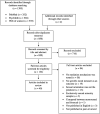Mediators of the Disparities in Depression Between Sexual Minority and Heterosexual Individuals: A Systematic Review
- PMID: 33689086
- PMCID: PMC8035121
- DOI: 10.1007/s10508-020-01862-0
Mediators of the Disparities in Depression Between Sexual Minority and Heterosexual Individuals: A Systematic Review
Abstract
Evidence suggests that sexual minorities (e.g., those identifying as lesbian, gay, or bisexual) experience increased rates of depression compared to heterosexual individuals. Minority stress theory suggests that this disparity is due to stigma experienced by sexual minorities. Stigma processes are proposed to contribute to reduced coping/support resources and increased vulnerability processes for mental health problems. This review provided a systematic examination of research assessing the evidence for mediating factors that help explain such disparities. A literature search was conducted using the databases PubMed, PsycINFO, and Web of Science. The review included 40 identified studies that examined mediators of sexual minority status and depressive outcomes using a between-group design (i.e., heterosexual versus sexual minority participants). Studies of adolescents and adult samples were both included. The most common findings were consistent with the suggestion that stressors such as victimization, harassment, abuse, and increased stress, as well as lower social and family support, may contribute to differing depression rates in sexual minority compared to heterosexual individuals. Differences in psychological processes such as self-esteem and rumination may also play a role but have had insufficient research attention so far. However, caution is needed because many papers had important methodological shortcomings such as the use of cross-sectional designs, inferior statistical analyses for mediation, or measures that had not been properly validated. Although firm conclusions cannot be drawn, the current evidence base highlights many factors potentially suitable for further exploration in high-quality longitudinal research or randomized studies intervening with the potential mediators.
Keywords: Depression; LGB; Mediation; Sexual minority; Sexual orientation.
Conflict of interest statement
There are no conflict of interest to declare.
References
-
- Achenbach, T. M., & Rescorla, L. A. (2001). ASEBA school-age forms & profiles. University of Vermont, Research Center for Children, Youth and Families.
-
- Achenbach, T. M., & Rescorla, L. A (2003). Manual for the ASEBA adult forms & profiles. University of Vermont, Research Center for Children, Youth and Families.
-
- Argyriou A, Goldsmith KA, Tsokos A, Rimes KA. Psychosocial mediators of the relations between sexual orientation and depressive symptoms in a longitudinal sample of young people. Psychology of Sexual Orientation and Gender Diversity. 2020;7:142–153. doi: 10.1037/sgd0000369. - DOI
Publication types
MeSH terms
LinkOut - more resources
Full Text Sources
Other Literature Sources
Medical


